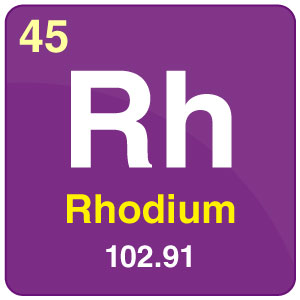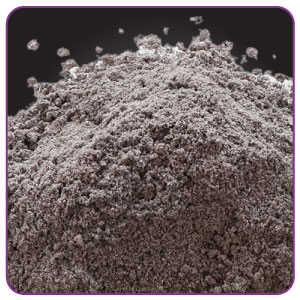Rhodium

| Symbol | Rh |
| Atomic Number | 45 |
| Atomic Mass | 102.91 g.mol -1 |
| Discovered by | William Wollaston in 1803 |

Chemical Properties of Rhodium
| Group | 9 | Melting point | 1963°C, 3565°F, 2236 K |
| Period | 5 | Boiling point | 3695°C, 6683°F, 3968 K |
| Block | d | Density (g cm−3) | 12.4 |
| Atomic number | 45 | Relative atomic mass | 102.906 |
| State at 20°C | Solid | Key isotopes | 103Rh, |
| Electron configuration | [Kr] 4d85s1 | CAS number | 7440-16-6 |
| ChemSpider ID | 22389 | ChemSpider is a free chemical database | |
What is Rhodium?
- Rhodium is one of the rarest elements, occurring in only one part of 109 in the earth’s crust. It has not been studied extensively and the interpretation of many of the published results is questionable due to uncertainties of the complex species involved. In general, rhodium chemistry resembles iridium as well as cobalt to some extent.
- As per the mineralogy of rhodium, only a little information has been collected. The minerals carry some rhodium up to 5 percent in rare specimens. Sperrylite may contain up to 0.72 percent of rhodium. Its metallic form is not soluble in aqua regia unless alloyed with gold, copper, lead, bismuth or platinum.
- Its metallic form is harder, tougher and has a higher melting point than that of platinum or palladium. It is softer, more ductile and less brittle than metallic iridium.
- Rhodium has a lower specific resistance and stable contact resistance due to the absence of oxide films on its surface. The metallic form of the element behaves more like platinum than palladium with respect to hydrogen. Rhodium readily absorbs the hydrogen gas when it is finely divided but its ability to absorb hydrogen is reduced when it is in a compact state. Compact rhodium is quite resistant to chemicals and attack by acids, even by aqua regia. Alkaline fusion is the usual technique for oxidising the metal.
Applications and Uses of Rhodium
- The extraction of the rhodium element is an intricate process because the ores are mixed with other metals such as palladium, silver, platinum, and gold and rhodium-bearing minerals are very few in number.
- Rhodium is primarily used in the production of platinum alloys, with resulting resistance materials and high hardness. These alloys are used in turbine reactors, electric ovens, and glass industries.
- The metal is also used in jewellery coating for silver objects and also circuit components, etc. Rhodium is an excellent coating layer for white gold jewels. It is done by the process of electrolytic deposition. This process makes the jewels more resistant and whiter.

Comments